Border Ministries Summit calls Christians serving migrants to common missionEmphasizes the complexities of border, immigration issuesPosted Nov 26, 2019 |
|
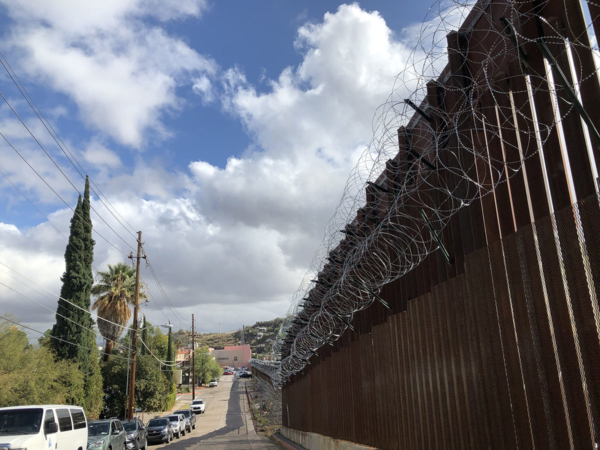
A section of the border wall cuts a line between Nogales, Arizona, and Nogales, Mexico. Photo: Lynette Wilson/Episcopal News Service
[Episcopal News Service – Tucson, Arizona] The steel border fence separating Nogales, Arizona, from Nogales, Mexico, follows a rolling hill, and depending on the slope, residents can sit on their porches and watch life unfold on either side.
It was the mayor of Nogales, Mexico, who in 1918 initiated a 6-foot wire fence separating the two cities, and countries, in a transborder “good fences make good neighbors” cooperative spirit.
A hundred years of history ensued, families living on either side crossing over: adults to work and shop, children to attend school. Up until a few years ago when the United States installed steel mesh between the slats, families would gather at tables set on either side and share meals, passing homemade foods through the fence.
Not anymore, though. A teenager’s death precipitated further separation.
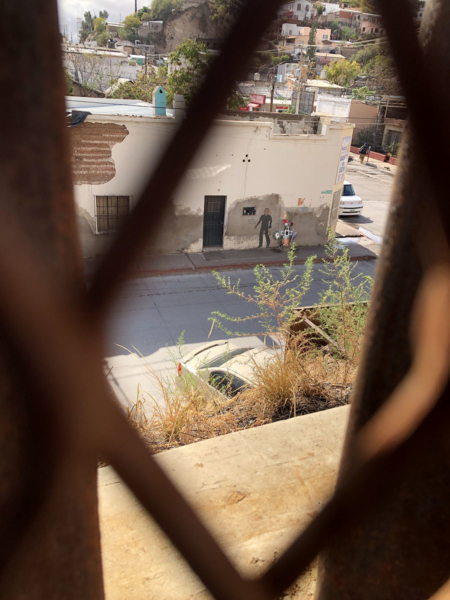
A mural of 16-year-old José Rodríguez memorializes him in Nogales, Mexico. Photo: Lynette Wilson/Episcopal News Service
In October 2012, U.S. Customs and Border Protection Agent Lonnie Swartz fatally shot 16-year-old José Rodríguez through the fence, the Rev. Rodger Babnew said as he pointed to a single-story concrete building on the Mexico side that features a mural memorializing the teen.
Babnew, a deacon serving St. Andrew’s Episcopal Church in Nogales, Arizona, is also a co-convener of Cruzando Fronteras, a Diocese of Arizona border ministry that, along with ecumenical partners, provides shelter, food, medical care and other assistance to migrants and asylum-seekers on the Mexico side of the border.
On Nov. 21, opening day of the second annual Border Ministries Summit, Babnew and a caravan of Episcopalians and other Christians drove 70 miles along Interstate 19 from Tucson to Nogales to see the border wall firsthand. In all, 200 Christians from across the United States had gathered at Saint Philip’s in the Hills Episcopal Church in north Tucson’s Catalina foothills for the summit held Nov. 21-23.
Summit participants learned about the 1,954-mile U.S.-Mexico border and its history, the U.S. immigration system, the impact of U.S. foreign and trade policy on societies and economies in Mexico and Central America, and the various ministries carried out by dioceses and churches along the border.
From Brownsville, Texas, to San Diego, California, Episcopalians are providing humanitarian aid to migrants and asylum-seekers and, where possible, support to law enforcement officers in their parishes and communities.
Historically, adult males made most of the attempts to cross the border, but in the last five or six years, families, women and unaccompanied minors – many fleeing violence in Honduras, El Salvador and Guatemala – have begun making the journey.
It’s not uncommon to see the border wall, which in most places is vertical steel slats, cutting a line through cities and small towns along the border. The border region extends 60 miles north of the wall into the United States where border agents make random stops at checkpoints along interstates and highways. Most migrants and asylum-seekers entering the United States make their way to destinations further beyond the border, reuniting with family and friends in other parts of the country.
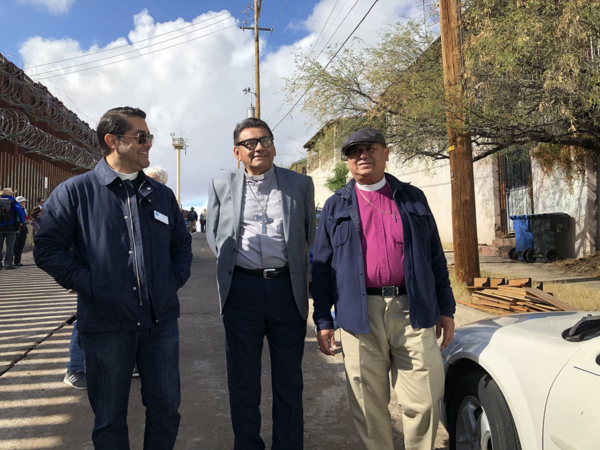
From left, the Rev. David Chavez, Diocese of Arizona missioner for border ministries; Western Mexico Bishop Ricardo Gómez Osnaya; and El Salvador Bishop Juan David Alvarado walk along the border wall in Nogales, Arizona. Photo: Lynette Wilson/Episcopal News Service
“We’re inviting folks to recognize that the migrant journey just doesn’t stop at the border; it continues as people step into our immigration process. We are called to continue to walk with, serve and be transformed by migrants as they journey through the process,” the Rev. David Chavez, Diocese of Arizona missioner for border ministries and a summit convener, said in a conversation with Episcopal News Service.
“I think the message is clear that the notion of ‘border’ is really fluid in this sense that a border is a horizon that we encounter whenever we encounter the other,” Chavez said. “It calls on us to find ways to go beyond our small communities, our zones of comfort, and maybe begin to bridge-build into communities of people who are radically different from us, and who may actually share the same mission that we share: to reach out, to be present, to walk with and to serve the stranger in our midst.”
Anglican and Episcopal bishops gathered at the conference issued a statement at the summit’s end recognizing the Americas’ shared history and the human desire for a safe, violence-free, economically viable life.
“We … acknowledge that North and Central America have a long history which we share, before the current nations existed. We have been bound together by shared cultures, languages and economies. We are in this situation together and we have been for centuries,” the statement read.
“To the migrants we want to say we gathered here with you in our hearts. We see you, we hear you, and we wish to stand with you in our common search for security, dignity, justice, and community.
“We also acknowledge that we are all seeking safety from violence and a peaceful way of life for our families. We stand against all criminal activity, the drugs which addict and enslave people, and those who would prey upon others through sex trafficking, kidnapping, and other forms of oppression.”
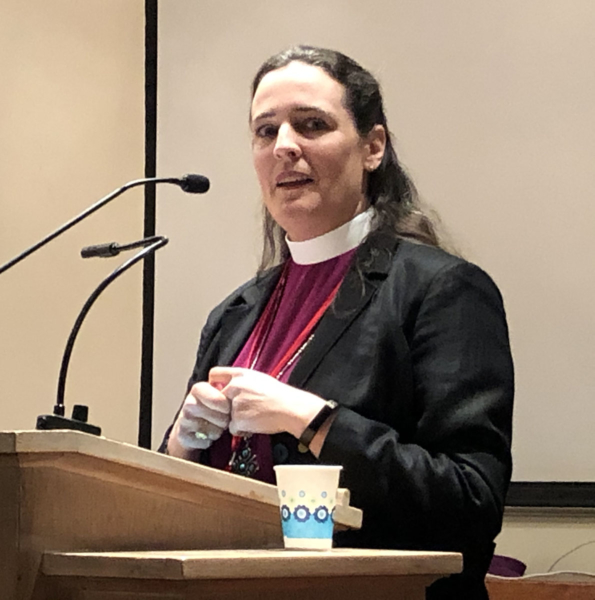
Arizona Bishop Jennifer Reddall welcomes 200 Episcopalians and ecumenical partners to the second annual Border Ministries Summit at St. Philip’s in the Hills in Tucson, Arizona. Photo: Lynette Wilson/Episcopal News Service
The bishops representing the dioceses of Texas, Arizona, Rio Grande, Los Angeles and San Diego, recognizing the diversity of political ideologies among Episcopalians, stressed that Matthew 25 calls Christians to welcome the stranger.
The first border summit took place in November 2018 in El Paso, Texas, at a time when migrant caravans from Central America arrived regularly at the U.S.-Mexico border in what became an unprecedented humanitarian crisis.
Earlier this year, detention centers at the U.S. border were over capacity as a steady stream of migrants, many of them from Central America, but some from as far away as China, India, Eritrea and Angola, plus others fleeing Cuba, Venezuela and Brazil, continued to arrive. In April, U.S. Customs and Border Protection detained 109,144 migrants, the highest number since 2007, at the southwestern border.
During a border summit session on Nov. 22, U.S. Border Patrol Tucson Sector Chief Roy Villareal, who joined the Tucson sector last March, acknowledged that the federal agency didn’t have the capacity in its detention centers and was not equipped to handle the humanitarian crisis at the border.
In Arizona, Sarah Eary, who coordinates the asylum program for Lutheran Social Services of the Southwest, has been trying to get chaplains placed in migrant detention centers.
“We want chaplains in all of them because we believe that the chaplaincy is there to provide the spiritual and emotional care that migrants need. … Our presence will not only care for the migrants, but will inhibit bad behavior from happening,” Eary told ENS.
The U.S. Border Patrol Tucson Sector covers 262 miles of border, which is patrolled by 3,900 agents. On Nov. 22, Homeland Security announced it would expand the Trump administration’s Migrant Protection Protocols program to the Tucson sector. The MPP, commonly called “Remain in Mexico,” requires asylum-seekers to wait in Mexico, some in shelters, some on the streets, while U.S. officials process their cases.
The effects of the Remain in Mexico program are visible in cities along the border. For instance, across the downtown bridge connecting Brownsville, Texas, to Matamoros, Mexico, the tent city that housed 20 or so families in May has grown to more than 200 tents, said Tatiana Hoecker, who volunteers with migrants in the Diocese of West Texas.
President Donald Trump campaigned on anti-immigrant rhetoric and, since taking office, has banned immigrants from predominantly Muslim countries, gutted the federal refugee resettlement program, implemented policies separating families at the southern border, cut aid to Central America and imposed the Remain in Mexico restrictions.
“The Trump administration’s policies are focused not only on curbing undocumented immigration, but also on substantially reducing legal immigration. From increasing bureaucracy, sending asylum-seekers back to Mexico and attempting to expand the ‘public charge’ provision, this administration’s aim is clear: They want fewer foreigners living in the United States, regardless of their immigration status,” said Rushad Thomas, policy adviser in the church’s Washington, D.C.-based Office of Government Relations.
“The Episcopal Church Office of Government Relations works every day to fulfill our mandate from General Convention, to advocate for a more just and humane immigration system,” wrote Thomas in an email to ENS. “That includes standing up for the rights of asylum-seekers at the southern border. In collaboration with our partners in the immigration advocacy community, we have actively pushed back against the Migrant Protection Protocols (Remain in Mexico Policy). This policy has been detrimental to the safety of asylum-seekers. MPP flouts America’s moral obligation to provide a safe haven for individuals fleeing violence and persecution in their homelands.
“OGR has also called upon lawmakers to provide humanitarian resources and real protection to our suffering sisters and brothers at the border,” he said.
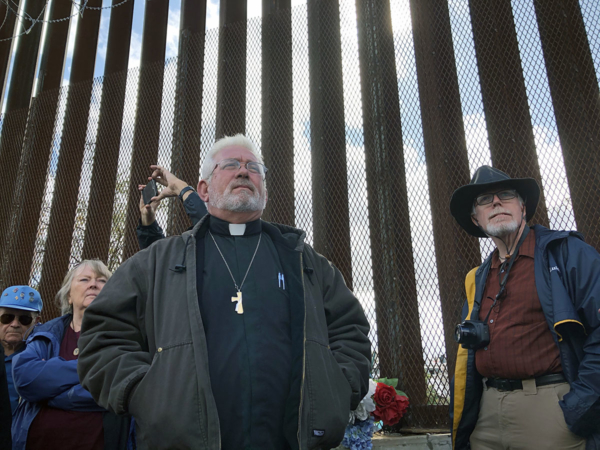
The Rev. Rodger Babnew, a deacon serving St. Andrew’s Episcopal Church in Nogales, Arizona, and a co-convener of Cruzando Fronteras, a Diocese of Arizona border ministry, led summit attendees on a tour of the U.S.-Mexico border in Nogales. Photo: Lynette Wilson/Episcopal News Service
Thirty-one percent of Arizona’s 7 million residents identify as Hispanic. Arizona was part of Mexico until 1848 and was the last territory in the lower 48 states admitted as a state in 1912, and it has 22 federally recognized Native American tribes.
Connecting to one’s own story of migration and immigration can lead to compassion for others making the journey today, said Arizona Bishop Jennifer Reddall in a sermon preached during the summit’s Nov. 22 evening Eucharist.
Reddall shared that, in the 1880s during the time of the German unification wars, one of her “great-great-great-great-great grandparents” sent their two boys, ages 12 and 14, to the United States from Germany.
“I can’t imagine how much fear they must have had to set those two boys alone on a boat to a place they’d never been. They didn’t even go to family. They went to Chicago; they got with friends,” said Reddall. “Our family doesn’t think they were literate because there are no letters, no letters back and forth. And I wonder if that mother put those boys on that boat and never heard another word.”
“I wonder if she lived with that doubt and that fear for her entire life. Think of so many mothers, so many fathers today who are having exactly the same conversation, exactly the same fear as my family did 140 years ago, and are making that same choice, that however bad that journey might be, however frightening the journey might be and however many perils may be on that journey, staying is worse,” she said.
On Nov. 22, during the morning session, bishops and clergy serving in El Salvador and Mexico outlined the dangers their citizens face: the high rates of violence, death, femicide, gangs and cartels controlling territories and the governments’ failure to protect citizens.
It’s critical that churches in the United States and churches in Central America and Mexico make connections and work together, said Western Mexico Bishop Ricardo Gómez Osnaya, during a presentation describing the violence in Mexico and shifting migration routes.
“The church cannot give up its prophetic voice. … The church needs to be a change agent in this type of work,” said Gómez in Spanish as interpreted in English. “This type of work can be lonely.”
Gómez attended last year’s summit along with 60 other people. The threefold increase in attendance this time indicates the level of interest people have in learning about the issues and partnering, he said.
“The more we understand, the more we can respond. But we can’t forget we are the church, and we must care for each other,” Gómez said.
Twenty of the Diocese of Arizona’s churches, including Grace St. Paul’s in Tucson, which is involved in the sanctuary movement, have ministries serving migrants. Back in Nogales, Cruzando Fronteras has the capacity to serve 200 asylum-seekers in two shelters. It also offers opportunities for people to visit the border, which Anthony Suggs, the Diocese of Colorado’s missioner for advocacy and social justice did in early November when he spent six days alongside Babnew experiencing the border from different angles.
“We were able to cross the border three times to spend time with the families staying at El Torres, one of Cruzando Fronteras’ shelters, hearing their stories and learning from their experiences. One resident, Eduardo, said over and over again, ‘I only need one chance. I only need one chance to make sure my family has la buena vida (the good life),’” said Suggs.
During his visit to Nogales, Suggs heard from border patrol agents who expressed opposition to expanding the border wall, and they asserted that it’s Congress’s job to fix the broken immigration system, not theirs, he said.
“We also had the opportunity to hike through the desert with the [Tucson] Samaritans, placing water along known migrant trails. All along the way, we saw sun-bleached scraps of clothing, remnants of the many journeys that had taken place there,” he told ENS. “Finally, we bore witness to a streamlined hearing at the federal courthouse in Tucson where, in a mere 90 minutes, 75 people were found guilty of illegally crossing the border and sentenced to deportation. A little less than one person a minute.”
His experience in Nogales and his attendance at the border ministries summit allowed him not only to learn, but to make connections with others engaged in serving migrants, asylum-seekers and immigrants across the church.
“Learning from bishops south and north of the border, a clear message emerged: We must act together, and we must act now,” Suggs said. “I have family members and loved ones who have been or are at risk for deportation. I’m not interested in waiting around while their lives in this country are at risk.”
– Lynette Wilson is a reporter and managing editor of Episcopal News Service.

Social Menu